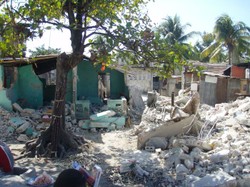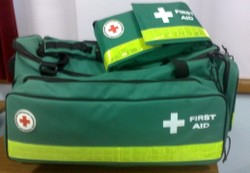There are many forms of disasters which affect the safety and health of millions across the globe. These include earthquakes, hurricanes, tornados, wildfires, volcanoes, floods, cyclones, temperature change, war and violence, human rights violations, and other events which cause major disruption in communities. These occurrences are especially problematic because it is not always possible to predict weather changes [2].

The Health Consequences of Disasters
The consequences of disasters can be extensive, and this depends on the location and type of event.
Internal Displacement versus Refugee Status
As of 2011, there were approximately 26.4 million people who had become internally displaced. Though internal displacement or refugee status may happen for similar reasons, the terms are not synonymous. Internal displacement is when people flee an area but do not leave their home country. Refugees, on the other hand, manage to cross the international border [2].
The home government is essentially responsible for the safety and shelter of internally displaced individuals. However, regardless of whether they are internally displaced or in refugee status, these victims have the advantage of international humanitarian law as well as assistance that they receive from the UN Refugee Agency [2].
The victims may lose their home, employment, food, water, and access to reasonable health care. They may not have the benefit of electricity or heat, and the use of wood fires poses a health hazard when ventilation is poor. Since many of these crises occur in developing countries, their previous vulnerabilities become worse with the disaster.
Infectious Disease Risk
When the health care system in these scenarios loses its infrastructure, there is risk of infectious disease and exacerbation of other chronic medical conditions which they may have had prior to the disaster. Immunizations may not be available, and this especially places children at risk for illness. Many of these emergencies take place in regions of the world where tuberculosis is rampant, and those who have that infection may not have access to medication to control it.
Tuberculosis and human immunodeficiency virus infection commonly occur in the same patient, and those who have been on antiretroviral therapy may not be able to continue the treatment. Hence, these infectious diseases may spread to others in the region and dramatically increase health care costs in the long run. Crowded living conditions in these situations worsen the risk for disease spread [1].
In regions where war has occurred, human rights violations such as sexual assault are common, and these contribute to mental health problems of the victims and their families [2].
Conclusion
The occurrence of disasters, whether natural or otherwise, presents an enormous challenge to governments and humanitarian aid agencies as well as the entire globe.
References
- Burki, T. (2013). The right to health for Syrian refugees. Lancet, 381, 2056.
- UN High Commissioner for Refugees. The UN Refugee Agency. (2013). Internally displaced people. Retrieved November 9, 2013.
- The photo is a 2010 view of an area in Haiti after the earthquake. Reprinted with permission from Centers for Disease Control/Lieutenant Commander Gary Brunette.
Disclaimer
The information contained in this article is for educational purposes only and should not be used for diagnosis or to guide treatment without the opinion of a health professional. Any reader who is concerned about his or her health should contact their physician for advice.
You might also like
First Aid: Would you Know What to Do?A medical emergency could happen at any moment. The question is whether you h...
Would You Recognize the Symptoms of Hypothermia in Time to Sav...If you've ever dithered, teeth chattering with the cold, you've been in the o...



 The Reality of Aspirinon 05/24/2021
The Reality of Aspirinon 05/24/2021
 An Old Microbeon 03/31/2021
An Old Microbeon 03/31/2021
 Coronavirus and Mental Illnesson 02/14/2021
Coronavirus and Mental Illnesson 02/14/2021
 Acute Ischemic Strokeon 12/25/2020
Acute Ischemic Strokeon 12/25/2020


Comments
Natural diasters can be very cruel - all we can hope for is governments planning ahead so they have the resources when a disaster hits.